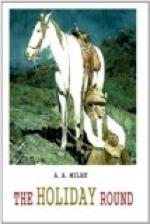“Why, to encourage the wonderful day, of course. Where is your gratitude, man? Don’t you want to do something to help? How can we let a day like this go past without some word of welcome? Out with the mower, and let us hail the passing of winter.”
James looked at me in disgust.
“Gratitude!” he said indignantly to Heaven. “And there’s my eleven crocuses in the front all a-singing together like anything on three bob a week!”
THE ORDEAL BY FIRE
Our Flame-flower, the Family Flame-flower, is now plainly established in the north-east corner of the pergola, and flourishes exceedingly. There, or thereabouts, it will remain through the generations to come—a cascade of glory to the eye, a fountain of pride to the soul. “Our fathers’ fathers,” the unborn will say of us, “performed this thing; they toiled and suffered that we might front the world with confidence—a family secure in the knowledge that it has been tried by fire and not found wanting....”
The Atherley’s flame-flower, I am glad to inform you, is dead.
. . . . . . .
We started the work five years ago. I was young and ignorant then—I did not understand. One day they led me to an old apple tree and showed me, fenced in at its foot, two twigs and a hint of leaf. “The flame-flower!” they said, with awe in their voices. I was very young; I said that I didn’t think much of it. It was from that moment that my education began....
Everybody who came to see us had to be shown the flame-flower. Visitors were conducted to the apple tree in solemn procession, and presented. They peered over the fence and said, “A-ah!” just as if they knew all about it. Perhaps some of them did. Perhaps some of them had tried to grow it in their own gardens.
As November came on and the air grew cold, the question whether the flame-flower should winter abroad became insistent. After much thought it was moved to the shrubbery on the southern side of the house, where it leant against a laburnum until April. With the spring it returned home, seemingly stronger for the change; but the thought of winter was too much for it, and in October it was ordered south again.
For the next three years it was constantly trying different climates and testing various diets. Though it was touch and go with it all this time our faith was strong, our courage unshaken. June, 1908, found it in the gravel-pit. It seemed our only hope....
And in the August of that year I went and stayed with the Atherleys.
. . . . . .
One morning at breakfast I challenged Miss Atherley to an immediate game of tennis.
“Not directly after,” said Mrs Atherley, “it’s so bad for you. Besides, we must just plant our flame-flower first.”
I dropped my knife and fork and gazed at her open-mouthed.
“Plant your—what?” I managed to say at last.




